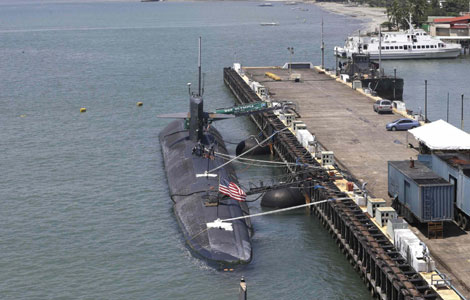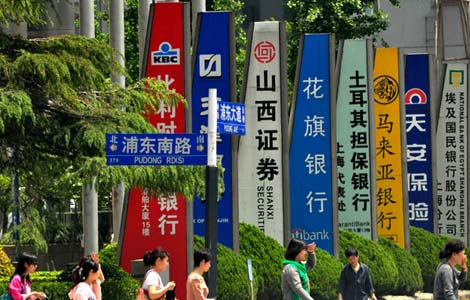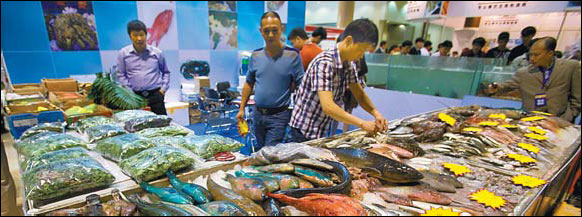Seafood businesses flounder amid cut in luxury spending
Updated: 2013-06-14 07:40
By Wang Zhuoqiong (China Daily)
|
||||||||
|
Seafood products displayed at a food and catering fair in Beijing. The crackdown on graft and extravagance is taking its toll on the country's high-end seafood market. Provided To China Daily |
Piles of high-end seafood - including lobsters, crabs and abalone - sat quietly in the small tanks of various vendors, during a visit to one of the largest aquatics markets in northern Beijing this week.
Store owners at the market, a major wholesaler for restaurants in the area, said they were disappointed by the sluggish levels of business for expensive aquatic products in recent months, the result of the ongoing decline in luxury catering across the nation.
"Top restaurants have cut their demands for high-end products," said one shop owner surnamed Lin.
"Expensive seafood such as abalone and lobsters are difficult to sell, despite prices dropping 30 percent compared with last year."
A kilogram of abalone now costs around 80 yuan ($12), against 140 yuan a year ago, and a lobster can be bought for less than 100 yuan, according to Li Jianchao, a restaurant owner in Beijing.
Abalone and lobster account for the majority of high-end seafood dishes in luxury restaurants.
Sales of imported dried seafood being sold in Jingshen Seafood Market in southern Beijing, for instance, have dropped two-thirds with almost zero demand from high-end restaurants, according to a report in China Securities Journal.
In such a depressed market, many high-end seafood traders have been forced to quit the businesses altogether, the journal added.
High-end seafood products at lower prices have lured many individual customers, however, while some medium and lower priced seafood remains popular, with some prices even rising, said Lin.
Bian Jiang, assistant director of the China Cuisine Association, said a decline in retail and wholesale seafood sales is inevitable, as the catering industry slows, and the effects are also hitting other related sectors of the industry, from breeding, to feeding, fishing, and seafood imports and exports.
"It has been the worst time for seafood-related industries in a decade," Bian said.
Homey Group of Shandong province, a listed food processing, aquaculture and ocean fishing company with more than 30 subsidiary companies, including 10 food processing plants, said it expects to see a reduction in its first quarter sales, according to China Investment Securities.
In December, the government launched a nationwide crackdown on graft and extravagance, which is now being blamed for what experts suggest is the biggest slowdown in the catering industry in a decade.
Revenues of high-end restaurants in Beijing, Shanghai and Chengdu were down at least 20 percent during this year's Spring Festival.
In the first quarter of the year, many top catering companies had to close branches or change their menus.
However, large chain restaurants have a different view on seafood sales.
Jingya Group, for instance, reported its seafood businesses have not been affected by the government policies yet and its seafood buying from suppliers in Shandong is little changed, according to Ma Yuming, a marketing executive at the company.
wangzhuoqiong@chinadaily.com.cn
(China Daily USA 06/14/2013 page17)

 Philippine, US start Naval exercise in S China Sea
Philippine, US start Naval exercise in S China Sea
 Supreme Court gay rights ruling celebrated across US
Supreme Court gay rights ruling celebrated across US
 Rudd returns as Australian PM after Gillard
Rudd returns as Australian PM after Gillard
 Brazil protests intensify before Confed Cup semifinal
Brazil protests intensify before Confed Cup semifinal
 Long lost weekend
Long lost weekend
 Park ready to charm China
Park ready to charm China
 Prices climb as police crack down
Prices climb as police crack down
 China 'most promising' in FDI
China 'most promising' in FDI
Most Viewed
Editor's Picks

|

|

|

|

|

|
Today's Top News
Proposed law puts curbs on family visas
Markets will stay volatile, continue to struggle: Expert
Promising outlook on US, China investment
US adoptees visit Chinese roots
Ecuador refutes Washington Post accusation
IBM to make Chinese job cuts
PBOC ends credit crunch, to go further
Snowden still at Moscow's airport, asylum pending
US Weekly

|

|








